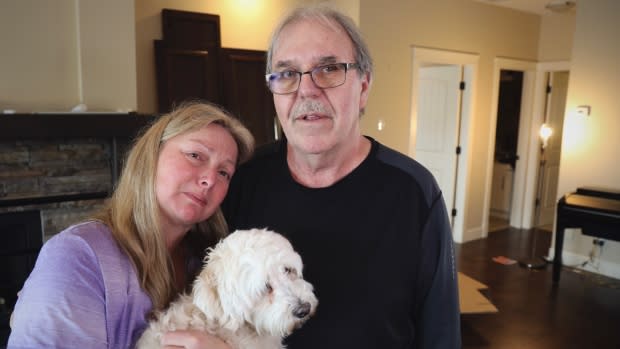Sechelt sinkholes could lead to years of expensive legal struggles
Emotions are still running high and tears continue to flow, as residents forced to evacuate their million-dollar ocean-view homes in Sechelt, B.C., try to figure out where they're going to stay, and where to store their belongings.
A series of sinkholes in the Seawatch neighbourhood led the District of Sechelt to order the evacuation on Friday and declare a local state of emergency.
Some owners of the 14 affected houses are still paying mortgages. At least one couple bought their home with cash. With no clear avenue to getting the area remediated, the homes and properties risk becoming worthless.

"The 14 houses that have been evacuated, they're suffering a large economic loss as far as the property is concerned, and they may be economically ruined," said Jay Straith, a lawyer who litigated a high-profile North Vancouver landslide case dating back to 2005.
It's possible legal recourse is the only hope the residents have, but it's a long expensive journey to find justice in the courts for a case like this.
"It's going to take — a good guess is — three to five years of litigation to get this thing sorted out," said Straith, adding that legal fees will likely run in the hundreds of thousands of dollars.
Straith said the list of people to sue is long, and anyone who gets caught up in the case would be expected to sue someone else.
"Oh yeah, it's one of these things we call a 'sue everyone in sight' situation," he said.
Legal sights could be set on any previous owners, the developer, the engineers who provided professional reports, real estate agents involved in sales, the local government, and so on.

The homeowners have been busy the last few days trying to clear out their houses, and haven't had much time to think about legal avenues.
Some residents have told CBC News they would collectively explore the issue. They have Vancouver lawyer John Laxton reviewing their case.
"We didn't overlook any of the due diligence required to move into a property like this. We did everything a prospective homeowner could possibly do to make sure that this place was safe— and we were lied to," said Rod Goy, a displaced Seawatch resident.
Goy's next door neighbour, Joanna Moradian, a real estate agent, fears losing everything.
"We bought it in good faith. We didn't know the situation in the subdivision, so we put everything into this home," said Moradian.

According to Straith, cases like this often come down to what was disclosed to buyers and when. If an omission was made when making a deal, that could be an avenue for legal action.
Many of the displaced residents have been sharply critical of the District of Sechelt's role in issuing the development permits in the first place.
"They can always, if they choose, take whatever actions they feel they need to do," said Sechelt mayor Darnelda Siegers. "As a municipality, we are pursuing a number of avenues — more get added every day."
Siegers said the sinkhole situation has given her municipality pause.
She said staff will be doing more due diligence, when it comes to other development projects in the future.
For Straith, a change in legislation at the provincial level could go a long ways to avoiding situations like this in the future. He wants to see issues like geotechnical red flags added to property title, so sellers don't have to disclose — it's just there.
"This shouldn't be happening in British Columbia," he said.
Is there more to this story? Email rafferty.baker@cbc.ca
Follow Rafferty Baker on Twitter: @raffertybaker

